VOA慢速英语 2008 1225b
时间:2018-12-01 作者:英语课 分类:VOA慢速英语2008年(十二)月
VOICE ONE:
I'm Steve Ember.
VOICE TWO:
And I'm Shirley Griffith with THE MAKING OF A NATION – American history in VOA Special English. Today we present a special program on Christmas traditions in the United States during the first half of the nineteenth century.
VOICE TWO:
During this period, Christmas was a very different kind of holiday than it is today. There was no set way of celebrating the day, which was not yet an official holiday. Communities around the country honored the day in different ways. Some observed Christmas as an important Christian 1 religious day honoring the birth of Jesus. Others celebrated 2 the day with parties, music, drinking and eating. And, some communities did not celebrate the day at all.
VOICE ONE:
But, it was during this period that Americans began to reinvent the holiday by combining ancient Christmas traditions from different cultures with modern American influences. You can think about the historical people we have been talking about, Andrew Jackson, Martin van Buren and others, and the ways they too might have celebrated Christmas.
(MUSIC)
VOICE TWO:
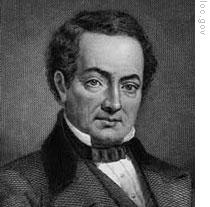
Washington Irving
In eighteen nineteen, the popular American writer Washington Irving wrote a series of five essays published in a book called "The Sketchbook of Geoffrey Crayon, Gent."
VOICE TWO:
The essays describe a wealthy British landowner who invites his farm workers into his home to celebrate Christmas. The landowner recreates a traditional Christmas as it would have been celebrated in the distant past. Irving praised this looking back to ancient traditions. He liked the idea of different levels of society coming together to enjoy a festive 3 and peaceful holiday. Washington Irving seemed to express concern about the lack of such unifying 4 Christmas traditions in modern America.
VOICE ONE:
Penne Restad wrote a book "Christmas in America: A History." It shows how Americans began to slowly shape Christmas into a unifying national holiday during the first half of the nineteenth century. She describes how Christmas had different meanings for Americans who came from different cultural and religious backgrounds. Many immigrants brought Christmas traditions from their own countries.
VOICE TWO:
Religion played a big role in how an American might celebrate the holiday. Calvinist Christians 5 banned the celebration of Christmas. But groups such as Episcopalians and Moravians honored the day with religious services and seasonal 6 decorations.
VOICE TWO:
By mid-century, Christian groups began to ignore their religious differences over the meaning of Christmas and honored the day in special ways.
(MUSIC)
VOICE ONE:
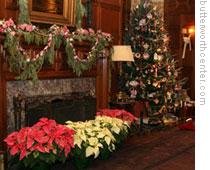
Traditional Christmas decorations
Christmas became an important time for families to celebrate at home. More and more Christian Americans also began to follow the European traditions of Christmas trees and giving gifts. Christians believed that the tree represented Jesus and was also a sign of new beginnings. German immigrants brought their tradition of putting lights, sweets and toys on the branches of evergreen 7 trees placed in their homes.
VOICE TWO:
This tradition of setting up a Christmas tree soon spread to many American homes. So did the practice of giving people presents. As these traditions increased in popularity, the modern trade and business linked to Christmas also grew.
VOICE ONE:
As Christmas became more popular, some states declared the day a state holiday. Louisiana was the first state to make the move in eighteen thirty-seven. By eighteen sixty, fourteen other states had followed. It was not until eighteen seventy that President Ulysses Grant made Christmas a federal holiday.
VOICE TWO:
Americans already knew old Christmas songs that came from England and other areas of Europe. But many new American Christmas songs started to become popular. For example, in eighteen forty-nine, a religious leader from Massachusetts wrote the words to "It Came Upon a Midnight Clear." The song "Jingle 8 Bells" appeared seven years later. And, a year later, a religious leader in Williamsport, Pennsylvania wrote the song "We Three Kings of Orient Are."
(MUSIC)
VOICE ONE:
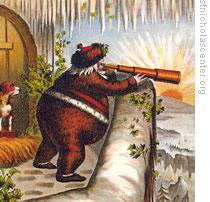
A nineteenth century drawing of Santa Claus
And of course, no discussion of Christmas would be complete without talking about of one of the holiday's most famous representations, Santa Claus.
VOICE ONE:
This character is based on the story of Saint Nicholas, a Christian holy person believed to have lived in the third century. Saint Nicholas became known as a protector of children. In his role as a Christmas hero, different cultures have given him different names. These include Sinterklaas, Kris Kringle and Father Christmas. But for most Americans his most popular name would become Santa Claus.
VOICE TWO:
In the nineteenth century, many Dutch immigrants living in the United States celebrated the feast of Saint Nicholas on December sixth. Saint Nicholas was especially important to New Yorkers because of their history as a Dutch colony. In eighteen-oh-nine, Washington Irving published his "History of New York." It lists Saint Nicholas as the patron saint of New Yorkers. He describes the saint wearing a low hat, large pants, and smoking a pipe. Does this description sound familiar?
VOICE ONE:
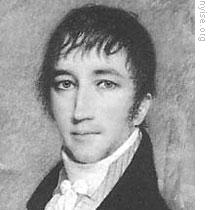
Clement 9 Clarke Moore
In eighteen twenty-two, an American professor named Clement Clarke Moore wrote a poem that redefined the image of Saint Nicholas. It was called "Account of a Visit from Saint Nicholas." He did not expect it to be published. He wrote it as a Christmas present for his young children. In recent years, experts have questioned whether Moore actually wrote the poem.
VOICE ONE:
Some believe it was written by Henry Livingston, a map maker 10 in New York who wrote and published funny poems in his spare time.
VOICE TWO:
But whoever wrote this classic poem, it has since become a favorite around the world. This poem combines the traditions of Santa Claus, seasonal decorations and gift-giving that have come to define Christmas in America. We leave you with Clement Clarke Moore's poem, popularly known as "'Twas the Night Before Christmas."
(MUSIC)
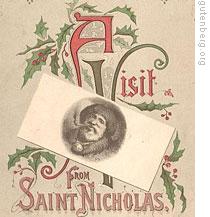
The cover of a nineteenth century version of the poem "A Visit from Saint Nicholas"
VOICE THREE:
'Twas the night before Christmas, when all through the house
Not a creature was stirring, not even a mouse.
The stockings were hung by the chimney with care,
In hopes that Saint Nicholas soon would be there.
The children were nestled all snug 11 in their beds,
While visions of sugar-plums danced in their heads.
And mamma in her ‘kerchief, and I in my cap,
Had just settled our brains for a long winter’s nap.
When out on the lawn there arose such a clatter,
I sprang from the bed to see what was the matter.
Away to the window I flew like a flash,
Tore open the shutters 12 and threw up the sash.
The moon on the breast of the new-fallen snow
Gave the lustre 13 of mid-day to objects below.
When, what to my wondering eyes should appear,
But a miniature sleigh, and eight tiny reindeer 14.
With a little old driver, so lively and quick,
I knew in a moment it must be Saint Nick.
More rapid than eagles his coursers they came,
And he whistled, and shouted, and called them by name!
"Now Dasher! Now, Dancer! Now, Prancer 15 and Vixen!
On, Comet! On, Cupid! On Donner and Blitzen!
To the top of the porch! To the top of the wall!
Now dash away! Dash away! Dash away all!"
As dry leaves that before the wild hurricane fly,
When they meet with an obstacle, mount to the sky.
So up to the house-top the coursers they flew,
With the sleigh full of toys, and Saint Nicholas, too.
And then, in a twinkling, I heard on the roof
The prancing 17 and pawing of each little hoof 18.
As I drew in my head, and was turning around,
Down the chimney Saint Nicholas came with a bound.
He was dressed all in fur, from his head to his foot,
And his clothes were all tarnished 19 with ashes and soot 20.
A bundle of toys he had flung on his back,
And he looked like a peddler, just opening his pack.
His eyes -- how they twinkled! His dimples how merry!
His cheeks were like roses, his nose like a cherry!
His droll 21 little mouth was drawn 22 up like a bow,
And the beard of his chin was as white as the snow.
The stump 23 of a pipe he held tight in his teeth,
And the smoke it encircled his head like a wreath.
He had a broad face and a little round belly,
That shook when he laughed, like a bowlful of jelly!
He was chubby 24 and plump, a right jolly old elf,
And I laughed when I saw him, in spite of myself!
A wink 16 of his eye and a twist of his head,
Soon gave me to know I had nothing to dread 25.
He spoke 26 not a word, but went straight to his work,
And filled all the stockings, then turned with a jerk.
And laying his finger aside of his nose,
And giving a nod, up the chimney he rose!
He sprang to his sleigh, to his team gave a whistle,
And away they all flew like the down of a thistle.
But I heard him exclaim, ‘ere he drove out of sight,
"Happy Christmas to all, and to all a good-night!"
(MUSIC)
VOICE ONE:
Our program was written and produced by Dana Demange. Jim Tedder 27 read the poem. I'm Steve Ember.
VOICE TWO:
And I'm Shirley Griffith. Transcripts 28, MP3s and podcasts of our programs are online at voaspecialenglish.com. Join us again next week for THE MAKING OF A NATION. And happy holidays from all of us in VOA Special English.
- They always addressed each other by their Christian name.他们总是以教名互相称呼。
- His mother is a sincere Christian.他母亲是个虔诚的基督教徒。
- He was soon one of the most celebrated young painters in England.不久他就成了英格兰最负盛名的年轻画家之一。
- The celebrated violinist was mobbed by the audience.观众团团围住了这位著名的小提琴演奏家。
- It was Christmas and everyone was in festive mood.当时是圣诞节,每个人都沉浸在节日的欢乐中。
- We all wore festive costumes to the ball.我们都穿着节日的盛装前去参加舞会。
- In addition, there were certain religious bonds of a unifying kind. 此外,他们还有某种具有一种统一性质的宗教上的结合。
- There is a unifying theme, and that is the theme of information flow within biological systems. 我们可以用一个总的命题,把生物学系统内的信息流来作为这一研究主题。
- Christians of all denominations attended the conference. 基督教所有教派的人都出席了这次会议。
- His novel about Jesus caused a furore among Christians. 他关于耶稣的小说激起了基督教徒的公愤。
- The town relies on the seasonal tourist industry for jobs.这个城镇依靠季节性旅游业提供就业机会。
- The hors d'oeuvre is seasonal vegetables.餐前小吃是应时蔬菜。
- Some trees are evergreen;they are called evergreen.有的树是常青的,被叫做常青树。
- There is a small evergreen shrub on the hillside.山腰上有一小块常绿灌木丛。
- The key fell on the ground with a jingle.钥匙叮当落地。
- The knives and forks set up their regular jingle.刀叉发出常有的叮当声。
- A clement judge reduced his sentence.一位仁慈的法官为他减了刑。
- The planet's history contains many less stable and clement eras than the holocene.地球的历史包含着许多不如全新世稳定与温和的地质时期。
- He is a trouble maker,You must be distant with him.他是个捣蛋鬼,你不要跟他在一起。
- A cabinet maker must be a master craftsman.家具木工必须是技艺高超的手艺人。
- He showed us into a snug little sitting room.他领我们走进了一间温暖而舒适的小客厅。
- She had a small but snug home.她有个小小的但很舒适的家。
- The shop-front is fitted with rolling shutters. 那商店的店门装有卷门。
- The shutters thumped the wall in the wind. 在风中百叶窗砰砰地碰在墙上。
- The sun was shining with uncommon lustre.太阳放射出异常的光彩。
- A good name keeps its lustre in the dark.一个好的名誉在黑暗中也保持它的光辉。
- The herd of reindeer was being trailed by a pack of wolves.那群驯鹿被一只狼群寻踪追赶上来。
- The life of the Reindeer men was a frontier life.驯鹿时代人的生活是一种边区生活。
- He tipped me the wink not to buy at that price.他眨眼暗示我按那个价格就不要买。
- The satellite disappeared in a wink.瞬息之间,那颗卫星就消失了。
- The lead singer was prancing around with the microphone. 首席歌手手执麦克风,神气地走来走去。
- The King lifted Gretel on to his prancing horse and they rode to his palace. 国王把格雷特尔扶上腾跃着的马,他们骑马向天宫走去。 来自辞典例句
- Suddenly he heard the quick,short click of a horse's hoof behind him.突然间,他听见背后响起一阵急骤的马蹄的得得声。
- I was kicked by a hoof.我被一只蹄子踢到了。
- The mirrors had tarnished with age. 这些镜子因年深日久而照影不清楚。
- His bad behaviour has tarnished the good name of the school. 他行为不轨,败坏了学校的声誉。
- Soot is the product of the imperfect combustion of fuel.煤烟是燃料不完全燃烧的产物。
- The chimney was choked with soot.烟囱被煤灰堵塞了。
- The band have a droll sense of humour.这个乐队有一种滑稽古怪的幽默感。
- He looked at her with a droll sort of awakening.他用一种古怪的如梦方醒的神情看着她.
- All the characters in the story are drawn from life.故事中的所有人物都取材于生活。
- Her gaze was drawn irresistibly to the scene outside.她的目光禁不住被外面的风景所吸引。
- He went on the stump in his home state.他到故乡所在的州去发表演说。
- He used the stump as a table.他把树桩用作桌子。
- He is stocky though not chubby.他长得敦实,可并不发胖。
- The short and chubby gentleman over there is our new director.那个既矮又胖的绅士是我们的新主任。
- We all dread to think what will happen if the company closes.我们都不敢去想一旦公司关门我们该怎么办。
- Her heart was relieved of its blankest dread.她极度恐惧的心理消除了。
- They sourced the spoke nuts from our company.他们的轮辐螺帽是从我们公司获得的。
- The spokes of a wheel are the bars that connect the outer ring to the centre.辐条是轮子上连接外圈与中心的条棒。
- Jim Tedder has more. 吉姆?特德将给我们做更多的介绍。 来自互联网
- Jim Tedder tells us more. 吉姆?泰德给我们带来更详细的报道。 来自互联网
- Like mRNA, both tRNA and rRNA are transcripts of chromosomal DNA. tRNA及rRNA同mRNA一样,都是染色体DNA的转录产物。 来自辞典例句
- You can't take the transfer students'exam without your transcripts. 没有成绩证明书,你就不能参加转学考试。 来自辞典例句